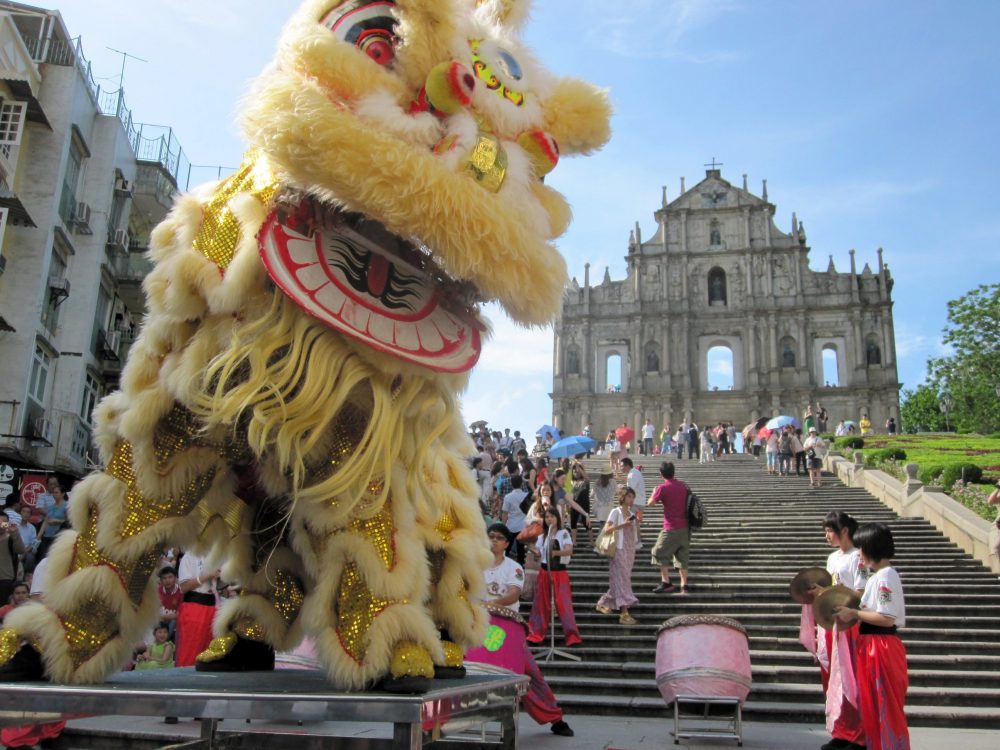Marco Carvalho
The Diocese of Macau will welcome the Year of the Tiger with the celebration of a Mass, presided over by Bishop Stephen Lee Bun-sang, followed by a performance of a Lion Dance troupe. The celebration, Father Daniel Ribeiro pointed out, is a good example of how harmoniously the Catholic Church coexists with Chinese culture and Chinese traditions.
The Cathedral parish will ring in the Year of the Tiger with the organization of a Lion Dance ceremony and a New Year’s gathering, which will be attended by Bishop Stephen Lee Bun-Sang and will bring together priests and parishioners.
Traditionally associated with happiness and renewal, the frenetic and colorful choreography of the Lion Dance will come about at the entrance to the Cathedral of the Nativity of Our Lady, right after a New Year’s Mass that will be celebrated by Bishop Stephen Lee: “There will be a Mass in the Cathedral, presided over by Bishop Lee Bun-Sang and, after that Mass, there will be a Lion Dance, which will be held right outside the Cathedral. After that, there will be a gathering that will bring together the priests who work in the Cathedral, the Bishop and the parishioners,” Father Daniel Ribeiro, vicar of the Cathedral parish, told O CLARIM.
The celebration, the Brazilian priest stressed, illustrates the harmonious way in which the local Catholic Church coexists with Chinese culture and Chinese traditions. The missionary, a member of the Congregation of the Priests of the Sacred Heart, argued that Macau has always been an example in terms of dialogue between religion and culture.
Cultural assets such as the Lion Dance, Father Ribeiro said, enrich the Church’s position: “With regard to the Chinese New Year, there is a difference between what Chinese culture is and what, for example, Buddhist beliefs are. In the sphere of Chinese culture, we will find aspects such as the Lion Dance or family gatherings. The Church has always addressed these manifestations in a very peaceful way, fostering the dialogue between religion and culture in Macau,” Daniel Ribeiro added. “Macau is a place where people coexist very well with cultural and religious differences. The Chinese traditions enriches the Church and the Church has never been against the local traditions,” the parish vicar of the Cathedral Church reiterates.
The arrival of the Lunar New Year can and should be celebrated festively by Chinese Catholics, but Father Daniel Ribeiro warns of the need to separate tradition and belief, especially when tradition turns to religious practices – such as burning incense at the temples or praying for the dead – that might open the door to religious syncretism: “When people start to adopt some Buddhist practices, when tradition takes on religious practices – be it in relation to Buddhism or other religions – the Church does not approve of the so-called religious syncretism,” the Brazilian priest elucidates. “What is religious syncretism? Basically, it is a mixture of religions. As long as this enculturation is purely and simply cultural, there is no problem. But when it enters the field of syncretism, of the mixture of religions, the Catholic Church defends that other religions must be respected, but the practices are different and that is how they must be maintained,” Father Daniel Ribeiro explains.
The Lunar Year of the Tiger begins next Tuesday, February 1st. The Golden Week of Chinese New Year, which always starts on Lunar New Year’s Eve, runs from January 31st to February 6th. In Macau, the start of the new lunar cycle will be officially celebrated with a fireworks display and a New Year’s parade.


 Follow
Follow


